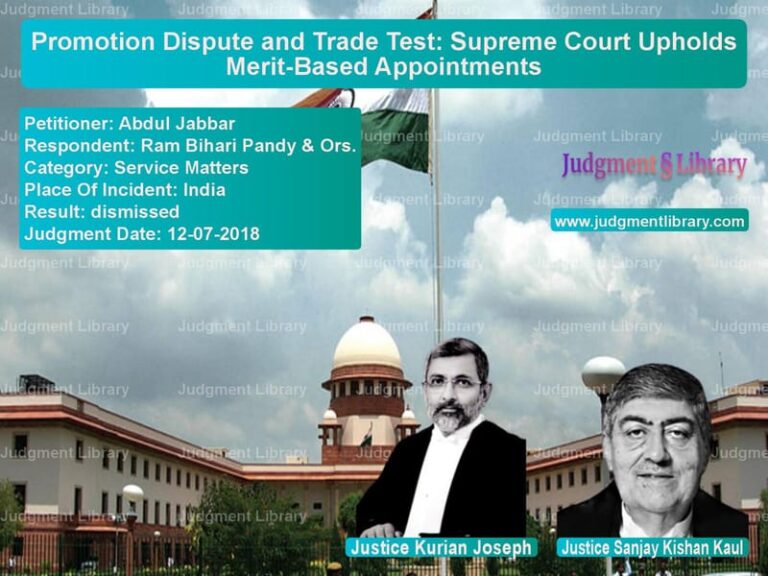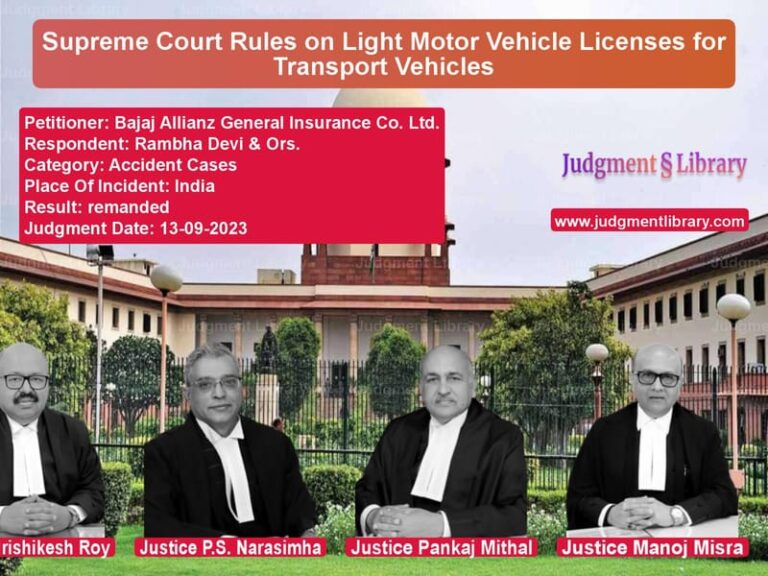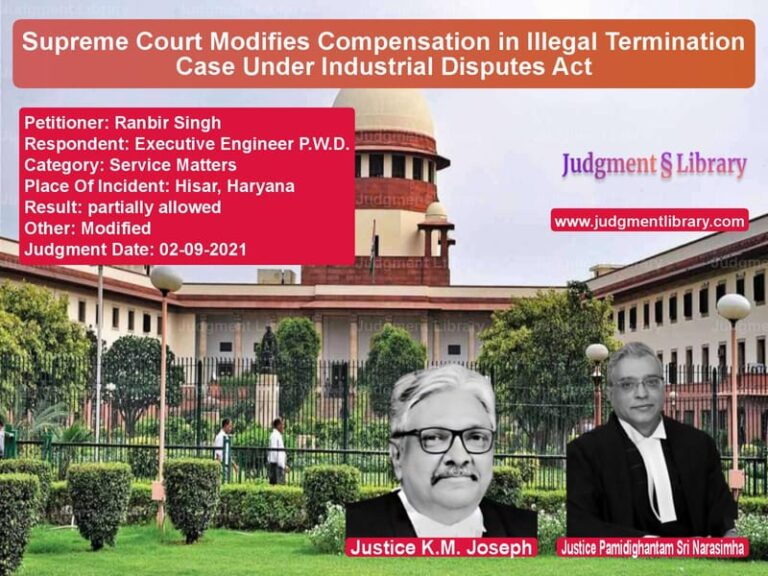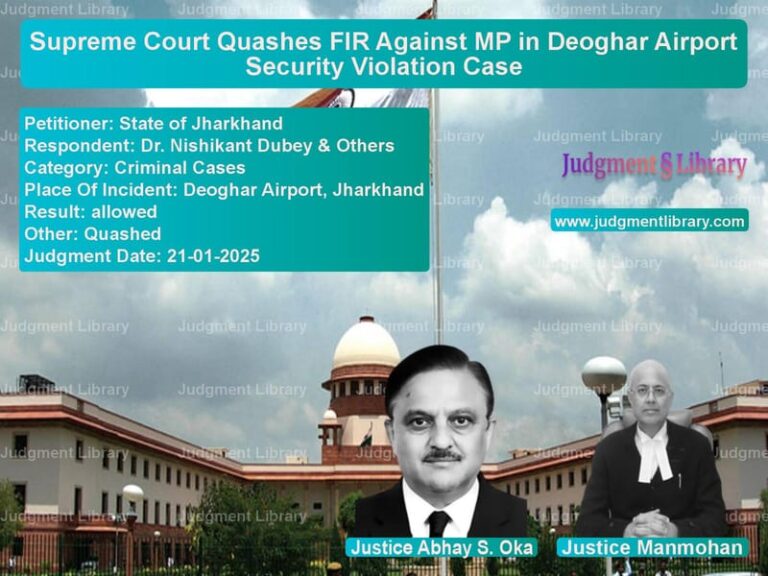Supreme Court Quashes Arms Act Case Against Man for Possession of Buttondar Knife
The Supreme Court of India has quashed criminal proceedings against Irfan Khan, who was accused under the Arms Act, 1959 for possessing a buttondar knife. The Court ruled that the charge was legally unsustainable as the prosecution failed to demonstrate that Khan’s possession of the knife violated the provisions of the law. The judgment sets a precedent in cases involving the possession of knives and other sharp-edged weapons.
Background of the Case
The case originated from an FIR No. 477 of 2022 filed on July 9, 2022, at the Govind Puri Police Station, Delhi. Irfan Khan was arrested for allegedly carrying a buttondar knife, and he was charged under:
- Section 25 of the Arms Act: Possession of prohibited arms without a license.
- Section 54 of the Arms Act: Requirement to inform authorities about prohibited weapons.
- Section 59 of the Arms Act: Penalty for contravening the Act.
The police report stated that Khan was found in Pravasi Park, acting suspiciously. Upon being searched, he was found carrying a buttondar knife with the following specifications:
- Total length: 31.5 cm
- Blade length: 14.5 cm
- Handle length: 17 cm
- Blade width: 3 cm
The Delhi police claimed that this violated the Delhi Administration Notification (DAD) dated October 29, 1980, which regulates the manufacture, sale, and possession of certain knives.
Legal Challenge and High Court Ruling
Khan filed a petition under Section 482 of the Code of Criminal Procedure (CrPC) before the Delhi High Court, seeking to quash the FIR and the charge sheet. He argued that:
- The buttondar knife he carried did not fall within the restricted category under the Arms Act, 1959.
- The DAD Notification applied only to knives intended for manufacture, sale, or possession for sale or test, not personal use.
- There was no evidence suggesting that he intended to sell or test the knife.
Despite these arguments, the Delhi High Court dismissed Khan’s plea, holding that the matter needed to be examined at trial.
Supreme Court’s Examination
The case then reached the Supreme Court, where Justices Pamidighantam Sri Narasimha and Sandeep Mehta reviewed the charges against Khan. The Court focused on two key legal issues:
1. Does Possession of a Buttondar Knife Violate the Arms Act?
The Court examined Rule 3 and Schedule I (Category V) of the Arms Rules, 2016, which regulate sharp-edged weapons:
“Sharp-edged and deadly weapons, including knives with blades longer than 9 inches (22.86 cm) or wider than 2 inches (5.08 cm), are covered under the Arms Act unless meant for domestic, agricultural, scientific, or industrial purposes.”
The Court found that Khan’s knife, though large, did not exceed these statutory limits.
2. Does the DAD Notification Apply?
The Delhi Administration Notification of 1980 restricts possession of buttondar knives with blades over 7.62 cm if they are intended for sale or testing. The Supreme Court noted that Khan’s charge sheet made no mention of him intending to sell or test the knife.
“The prosecution cannot be allowed to improve its case at trial when the charge sheet lacks basic allegations supporting the offense.”
Since the prosecution failed to provide any evidence that Khan was engaged in the manufacture, sale, or testing of the knife, the case had no legal standing.
Supreme Court’s Final Judgment
The Supreme Court ruled:
- The FIR and charge sheet against Irfan Khan were quashed.
- The Delhi High Court’s order was set aside.
- Khan’s prosecution under Sections 25, 54, and 59 of the Arms Act was declared invalid.
Implications of the Judgment
This ruling has significant implications for cases involving possession of knives and other sharp-edged weapons:
1. Clarification on Arms Act Application
The Court reaffirmed that not all knives qualify as “arms” under the Act. Unless a knife exceeds statutory dimensions or is intended for sale, it does not violate the law.
2. Protection Against Unwarranted Prosecutions
The decision prevents misuse of the Arms Act against individuals who merely carry knives for personal reasons.
3. Limits on Police Powers
The judgment curbs arbitrary arrests based on broad interpretations of legal provisions.
Conclusion
The Supreme Court’s decision in Irfan Khan vs. State (NCT of Delhi) upholds legal principles that prevent wrongful prosecution under the Arms Act. By quashing the FIR, the Court ensures that individuals are not subjected to criminal trials without substantial legal justification. This case serves as a crucial precedent in distinguishing between legitimate possession and criminal intent under India’s arms laws.
Read also: https://judgmentlibrary.com/cbi-vs-jagat-ram-bribery-conviction-and-high-courts-reversal/
Petitioner Name: Irfan Khan.Respondent Name: State (NCT of Delhi).Judgment By: Justice Pamidighantam Sri Narasimha, Justice Sandeep Mehta.Place Of Incident: Govind Puri, Delhi.Judgment Date: 03-12-2024.
Don’t miss out on the full details! Download the complete judgment in PDF format below and gain valuable insights instantly!
Download Judgment: irfan-khan-vs-state-(nct-of-delhi)-supreme-court-of-india-judgment-dated-03-12-2024.pdf
Directly Download Judgment: Directly download this Judgment
See all petitions in Bail and Anticipatory Bail
See all petitions in Fraud and Forgery
See all petitions in Custodial Deaths and Police Misconduct
See all petitions in Judgment by P.S. Narasimha
See all petitions in Judgment by Sandeep Mehta
See all petitions in allowed
See all petitions in Quashed
See all petitions in supreme court of India judgments December 2024
See all petitions in 2024 judgments
See all posts in Criminal Cases Category
See all allowed petitions in Criminal Cases Category
See all Dismissed petitions in Criminal Cases Category
See all partially allowed petitions in Criminal Cases Category







